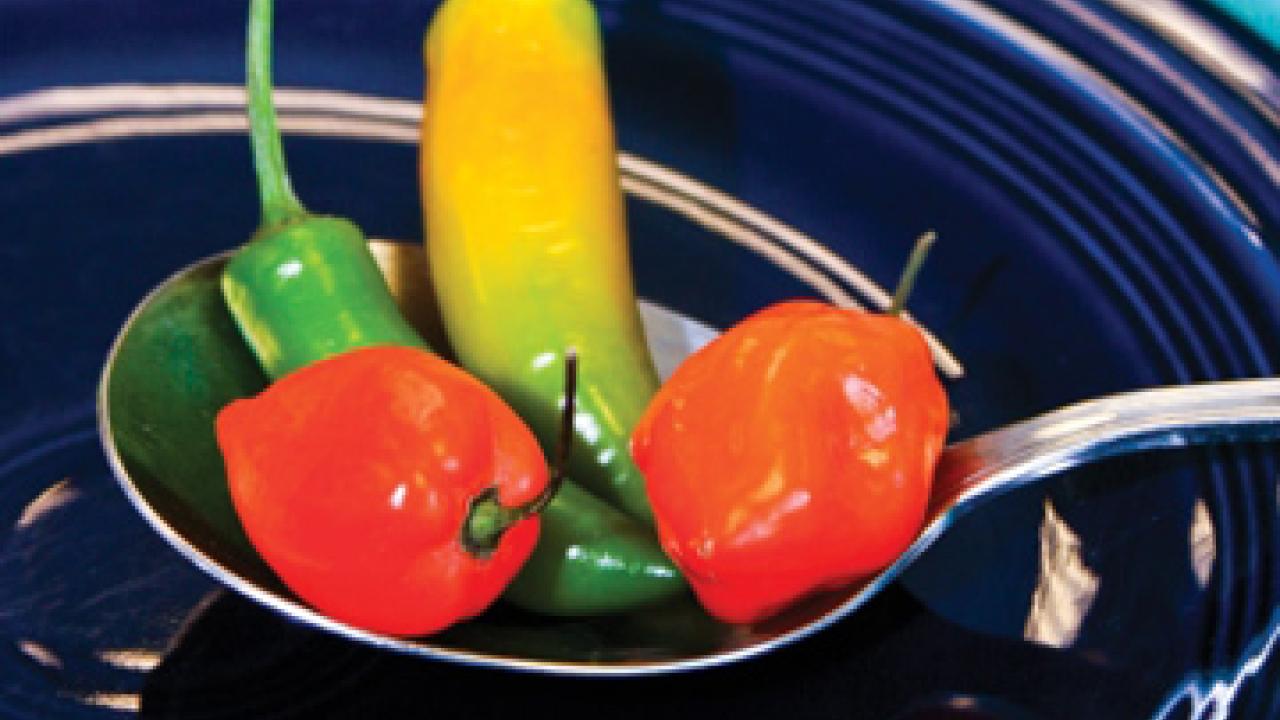Food, Etc.: Wednesday Night Wine Flight, May 4
Dateline staff
The University Library is giving us a taste of the academic side of nuevo Latin or Pan-Latin cuisine — and a real taste, too.
The academic material is in a new exhibition, Nuevo Latino Cuisine, running through summer in the lobby of Shields Library. An afternoon program with lunch and speakers is set for Monday, May 9 (see details below).
The exhibition is the work of Myra Appel, head of the Humanities, Social Sciences and Government Information Services Department, and bibliographer for Latin American Studies. She said “adventurous chefs, inspired by their Latino culinary heritage,” create the “imaginative and diverse” nuevo Latin by melding fresh ingredients — bursting with “sabor” (flavor), color and texture — with the gastronomic traditions of Latin America, the Caribbean, the Iberian Peninsula and even California.
“Throughout Latin America, innovative chefs are interpreting their traditional recipes through the lens of international cuisines from Asia, the Middle East, Europe and North America to create gourmet Latino or ‘alta cocina’ dishes,” Appel said.
“Issues of sustainability and globalization, aesthetic values and pride in a cultural heritage challenge these innovators to create an art form and to promote their work in contemporary books and periodicals.”
The exhibition draws on the University Library’s collections on native foods, agricultural sustainability, and the impact of historical events on the definitions of national cuisines and the cultural representation of these varied cuisines. The scholarship comes from several disciplines: history, agricultural economics, anthropology and the life sciences.
Cookbooks are included, with Appel explaining how these volumes document cultures and values among families, ethnic groups and societies, across time and geographic and political boundaries.
The exhibition also looks at the antecedents of a contemporary cuisine considered by many to be exciting and by others to be a “hodgepodge” of taste, texture and form.
“The initial fusion cuisines evolved as successive groups of conquerors, colonizers and immigrants introduced their new foodstuffs and culinary techniques and blended them with indigenous Latin American ingredients and recipes,” Appel said. “These ‘mestizo’ and ‘criollo’ recipes now are considered the classic national dishes of their countries. The influences of Spain and Portugal, Africa, China and Japan, Italy, Lebanon, and France, to name only a few contributors, appear in meals served within homes and restaurants throughout Mexico, Central America, South America and the Caribbean.”
Appel has prepared a bibliography to go with the exhibition.
Nuevo Latino Cuisine: Culinary Artistry, Community and Conversation
This is the afternoon program, scheduled from noon to 5 p.m. Monday, May 9, at the Putah Creek Lodge.
The speakers and their topics:
• Ken Albala, food historian — “The Roots of Latin American Food.” Albala, a professor at the University of the Pacific, is the author and editor of such publications as Eating Right in the Renaissance and A Cultural History of Food.
• Steve Sando, culinary consultant — “Redefining the New American Kitchen: Bringing Latin American Heirloom Ingredients to the Modern Table.” Sando, owner of Rancho Gordo New World Specialty Food in Napa, is the author of Heirloom Beans.
• Leopoldo López Gil, restaurateur — “The New, Modern Latin Cuisine,” including a discussion of the ingredients and culinary traditions that encourage chefs and serious home cooks to experiment and create new fusion dishes. López and his daughter Adriana López Vermut own the Pica Pica Maize Kitchen restaurants in Napa and San Francisco. Leopoldo López is a founding member of the slow food movement in Venezuela and recently assumed the presidency of the Academia Venezolana de Gastronomía.
• Clare Hasler, executive director, Robert Mondavi Institute for Wine and Food Science — On food studies and the importance of research and outreach across the sciences and humanities-social sciences, and how the RMI has fostered interdisciplinary projects.
Cost: $50, including lunch. Registration and more information. Contact: Myra Appel, mlappel@lib.ucdavis.edu.
Media Resources
Dave Jones, Dateline, 530-752-6556, dljones@ucdavis.edu
